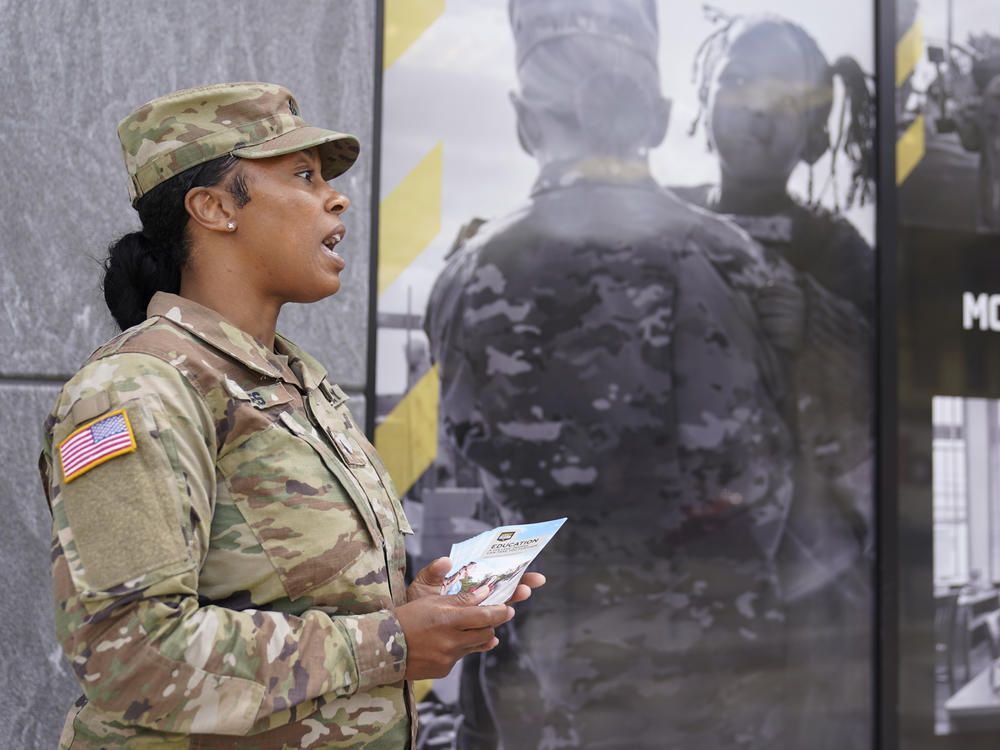Section Branding
Header Content
The U.S. Army is falling short of its recruitment goals. She has a plan for that
Primary Content
For years, the U.S. Army has not been able to meet its annual recruitment goal. The Secretary of the Army, Christine Wormuth, is rolling out a plan to address that.
What is it? Well, a little bit of something old, and a little bit of something new.
- The Army is bringing back its iconic ad with the slogan, "Be all you can be," which was everywhere in the '80s, hoping to inspire new recruits and perhaps touch on that nostalgia nerve too.
- But more broadly, the Pentagon is seeking to widen the net for recruits; focusing less on traditional pools and seeking to expand to new groups.
What's the big deal? Well, for nearly a decade, the Army has been falling short of its recruitment goals, and the shortage doesn't seem to be getting better.
- In 2022, for example, the U.S. Army missed its recruiting goal by about 15,000 soldiers — or 25%.
- For young people, especially Gen Z, increasing distrust in institutions is also likely playing a part; and some younger Americans that NPR spoke to about joining the Army said they were afraid of getting hurt or killed if they were to serve.
- Other concerns voiced by students include reports of racial bias and sexual assault within the armed forces.
What are people saying? The Secretary of the Army, Christine Wormuth, spoke to All Things Considered about the specifics with this recruiting strategy, and how they hope to adapt.
On bringing in college students and immigrants:
Right now, 50% of our new recruits are high school graduates. But when you look at the actual labor market, only 15% to 20% of the labor market are people with just high school degrees.
So there is a much bigger pool that we need to be fishing in, if you will. So a lot of the changes we're going to make are aimed at helping our recruiters be able to talk to people who have gone beyond high school.
On why recruiting has become such a struggle:
First of all, the percentage of young Americans who are eligible to serve — who are physically fit enough, and who are mentally prepared to join the military — that pool has been shrinking over time. And now it's really only about 23% of people between 18 and 24 that meet our standards.
[Things like] a criminal record or maybe issues with depression or other things like that [remove someone from the running.]
Then also, the percentage of young Americans who are interested in joining the military has been declining over time. There was a big surge, obviously, when the country was attacked on 9/11, more than 20 years ago.
I think when you look at Generation Z, you see a lot of the declining trust in institutions. There's some skepticism. And so we've got to overcome all of that and help young people see all of the possibilities that are available in the United States Army.
Want more on the U.S.? Listen to Consider This on how a government shutdown could impact millions of Americans.
On declining American trust in the military:
I think if you look at polling, Americans' trust in institutions has been declining steadily.
Other than small businesses, the United States military is the most respected institution. So Americans still, I think, have a huge amount of trust in the military.
But I do think that we're suffering under the same dynamics as many other places. And I think Americans look and see a fair amount of dysfunction in our government. Obviously, I think the legacy of Iraq and Afghanistan is a factor for people.
So, what now?
- The Army isn't the only branch of the military struggling to attract new members: The Navy and the Air Force also fell short of their goals last year.
- Wormuth says that despite these difficulties, she's always open to difficult questions from possible recruits: "I absolutely welcome critics. I mean, I believe in the product, if you will."
Learn more:
- Who's in the Army now? A pitch switch aims to get more military recruits
- What a government shutdown would mean for the U.S. military — and national security
- Despite efforts of 3 U.S. administrations, migrant families keep crossing the border
Copyright 2023 NPR. To see more, visit https://www.npr.org.



